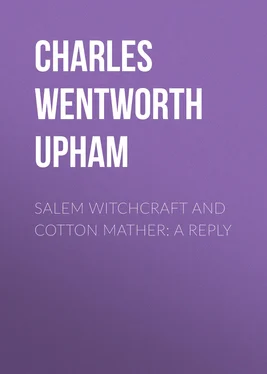Charles Wentworth Upham - Salem Witchcraft and Cotton Mather - A Reply
Здесь есть возможность читать онлайн «Charles Wentworth Upham - Salem Witchcraft and Cotton Mather - A Reply» — ознакомительный отрывок электронной книги совершенно бесплатно, а после прочтения отрывка купить полную версию. В некоторых случаях можно слушать аудио, скачать через торрент в формате fb2 и присутствует краткое содержание. Жанр: foreign_prose, История, foreign_edu, foreign_antique, на английском языке. Описание произведения, (предисловие) а так же отзывы посетителей доступны на портале библиотеки ЛибКат.
- Название:Salem Witchcraft and Cotton Mather: A Reply
- Автор:
- Жанр:
- Год:неизвестен
- ISBN:нет данных
- Рейтинг книги:3 / 5. Голосов: 1
-
Избранное:Добавить в избранное
- Отзывы:
-
Ваша оценка:
- 60
- 1
- 2
- 3
- 4
- 5
Salem Witchcraft and Cotton Mather: A Reply: краткое содержание, описание и аннотация
Предлагаем к чтению аннотацию, описание, краткое содержание или предисловие (зависит от того, что написал сам автор книги «Salem Witchcraft and Cotton Mather: A Reply»). Если вы не нашли необходимую информацию о книге — напишите в комментариях, мы постараемся отыскать её.
Salem Witchcraft and Cotton Mather: A Reply — читать онлайн ознакомительный отрывок
Ниже представлен текст книги, разбитый по страницам. Система сохранения места последней прочитанной страницы, позволяет с удобством читать онлайн бесплатно книгу «Salem Witchcraft and Cotton Mather: A Reply», без необходимости каждый раз заново искать на чём Вы остановились. Поставьте закладку, и сможете в любой момент перейти на страницу, на которой закончили чтение.
Интервал:
Закладка:
In an account, however, of the affair, written by this same John Goodwin, and printed by Mather, in London, ten years before, in The Memorable Providences relating to Witchcraft and Possessions , a somewhat different position is assigned to Mather. After saying "the Ministers did often visit us," he mentions "Mr. Mather particularly." "He took much pains in this great service, to pull this child and her brother and sister, out of the hands of the Devil. Let us now admire and adore that fountain, the Lord Jesus Christ, from whence those streams come. The Lord himself will requite his labor of love." In 1690, Mather was willing to have Goodwin place him in the foreground of the picture, representing him as pulling the children out of the hand of the Devil. In 1700, it was expedient to withdraw him into the background: and Goodwin, accordingly, provided the Committee, of which he was a member, with a Certificate of a somewhat different color and tenor.
The execution of the woman, Glover, on the charge of having bewitched these Goodwin children, is one of the most atrocious passages of our history. Hutchinson 1 1 When, in this article, I cite the name "Hutchinson," without any distinguishing prefix, I mean Thomas Hutchinson, Chief-justice, Governor, and Historian of Massachusetts; so also when I cite the name "Mather," I mean Cotton Mather.
says she was one of the "wild Irish," and "appeared to be disordered in her senses." She was a Roman Catholic, unable to speak the English language, and evidently knew not what to make of the proceedings against her. In her dying hour, she was understood by the interpreter to say, that taking away her life would not have any effect in diminishing the sufferings of the children. The remark, showing more sense than any of the rest of them had, was made to bear against the poor old creature, as a diabolical imprecation.
Between the time of her condemnation and that of her execution, Cotton Mather took the eldest Goodwin child into his family, and kept her there all winter. He has told the story of her extraordinary doings, in a style of blind and absurd credulity that cannot be surpassed. "Ere long," says he, "I thought it convenient for me to entertain my congregation with a Sermon on the memorable providence, wherein these children had been concerned, (afterwards published)."
In this connection, it may be remarked that had it not been for the interference of the Ministers, it is quite likely that "the sad circumstances from the invisible world," in the Goodwin family, would never have been heard of, beyond the immediate neighbourhood. It is quite certain that similar "circumstances," in Mr. Parris's family, in 1692, owed their general publicity and their awful consequences, to the meetings of Ministers called by him. If the girls, in either case, had been let alone, they would soon have been weary of what one of them called their "sport;" and the whole thing would have been swallowed, with countless stories of haunted houses and second sight, in deep oblivion.
In considering Cotton Mather's connection with the case of the Goodwin children, and that of the accusing girls, at Salem Village, justice to him requires that the statements, in my book, of the then prevalent notions, of the power and pending formidableness of the Kingdom of Darkness, should be borne in mind. It was believed by Divines generally, and by people at large, that here, in the American wilderness, a mighty onslaught upon the Christian settlements was soon to be made, by the Devil and his infernal hosts; and that, on this spot, the final battle between Satan and the Church, was shortly to come off. This belief had taken full possession of Mather's mind, and fired his imagination. In comparison with the approaching contest, all other wars, even that for the recovery of the Holy Sepulchre, paled their light. It was the great crusade, in which hostile powers, Moslem, Papal, and Pagan, of every kind, on earth and from Hell, were to go down; and he aspired to be its St. Bernard. It was because he entertained these ideas, that he was on the watch to hear, and prompt and glad to meet, the first advances of the diabolical legions. This explains his eagerness to take hold of every occurrence that indicated the coming of the Arch Enemy.
And it must further be borne in mind that, up to the time of the case of the Goodwin children, he had entertained the idea that the Devil was to be met and subdued by Prayer. That, and that only, was the weapon with which he girded himself; and with that he hoped and believed to conquer. For this reason, he did not advise Goodwin to go to the law. For this reason, he labored in the distressed household in exercises of prayer, and took the eldest child into his own family, so as to bring the battery of prayer, with a continuous bombardment, upon the Devil by whom she was possessed. For this reason, he persisted in praying in the cell of the old Irish woman, much against her will, for she was a stubborn Catholic. Of course, he could not pray with her, for he had no doubt she was a confederate of the Devil; and she had no disposition to join in prayer with one whom, as a heretic, she regarded in no better light; but still he would pray, for which he apologized, when referring to the matter, afterward.
Cotton Mather was always a man of prayer. For this, he deserves to be honored. Prayer, when offered in the spirit, and in accordance with the example, of the Saviour—"not my will but thine be done," "Your Father knoweth what things ye have need of before ye ask him—" is the noblest exercise and attitude of the soul. It lifts it to the highest level to which our faculties can rise. It
"opens heaven; lets down a stream
Of glory on the consecrated hour
Of man, in audience with the Deity."
It was the misfortune of Cotton Mather, that an original infirmity of judgment, which all the influences of his life and peculiarities of his mental character and habits tended to exaggerate, led him to pervert the use and operation of prayer, until it became a mere implement, or device, to compass some personal end; to carry a point in which he was interested, whether relating to private and domestic affairs, or to movements in academical, political, or ecclesiastical spheres. While according to him entire sincerity in his devotional exercises, and, I trust, truly revering the character and nature of such expressions of devout sensibility and aspirations to divine communion, it is quite apparent that they were practiced by him, in modes and to an extent that cannot be commended, leading to much self-delusion and to extravagances near akin to distraction of judgment, and a disordered mental and moral frame. He would abstain from food—on one occasion, it is said, for three days together—and spend the time, as he expresses it "in knocking at the door of heaven." Leaving his bed at the dead hours of the night, and retiring to his study, he would cast himself on the floor, and "wrestle with the Lord." He kept, usually, one day of each week in such fasting, sometimes two. In his vigils, very protracted, he would, in this prostrate position, be bathed in tears. By such exhausting processes, continued through days and nights, without food or rest, his nature failed; he grew faint; physical weakness laid him open to delusions of the imagination; and his nervous system became deranged. Sometimes, heaven seemed to approach him, and he was hardly able to bear the ecstasies of divine love; at other times, his soul would be tossed in the opposite direction: and often, the two states would follow each other in the same exercise, as described by him in his Diary: 2 2 The passages from Cotton Mather's Diary, used in this article, are mostly taken from the Christian Examiner , xi., 249; Proceedings of Massachusetts Historical Society , i., 289, and iv., 404; and Life of Cotton Mather , by William B. O. Peabody, in Sparks's American Biography , vi., 162.
—"Was ever man more tempted than the miserable Mather? Should I tell in how many forms the Devil has assaulted me, and with what subtlety and energy his assaults have been carried on, it would strike my friends with horror. Sometimes, temptations to vice, to blasphemy, and atheism, and the abandonment of all religion as a mere delusion, and sometimes to self-destruction itself. These, even these, do follow thee, O miserable Mather, with astonishing fury. But I fall down into the dust, on my study floor, with tears, before the Lord, and then they quickly vanish, and it is fair weather again. Lord what wilt thou do with me?"
Интервал:
Закладка:
Похожие книги на «Salem Witchcraft and Cotton Mather: A Reply»
Представляем Вашему вниманию похожие книги на «Salem Witchcraft and Cotton Mather: A Reply» списком для выбора. Мы отобрали схожую по названию и смыслу литературу в надежде предоставить читателям больше вариантов отыскать новые, интересные, ещё непрочитанные произведения.
Обсуждение, отзывы о книге «Salem Witchcraft and Cotton Mather: A Reply» и просто собственные мнения читателей. Оставьте ваши комментарии, напишите, что Вы думаете о произведении, его смысле или главных героях. Укажите что конкретно понравилось, а что нет, и почему Вы так считаете.












